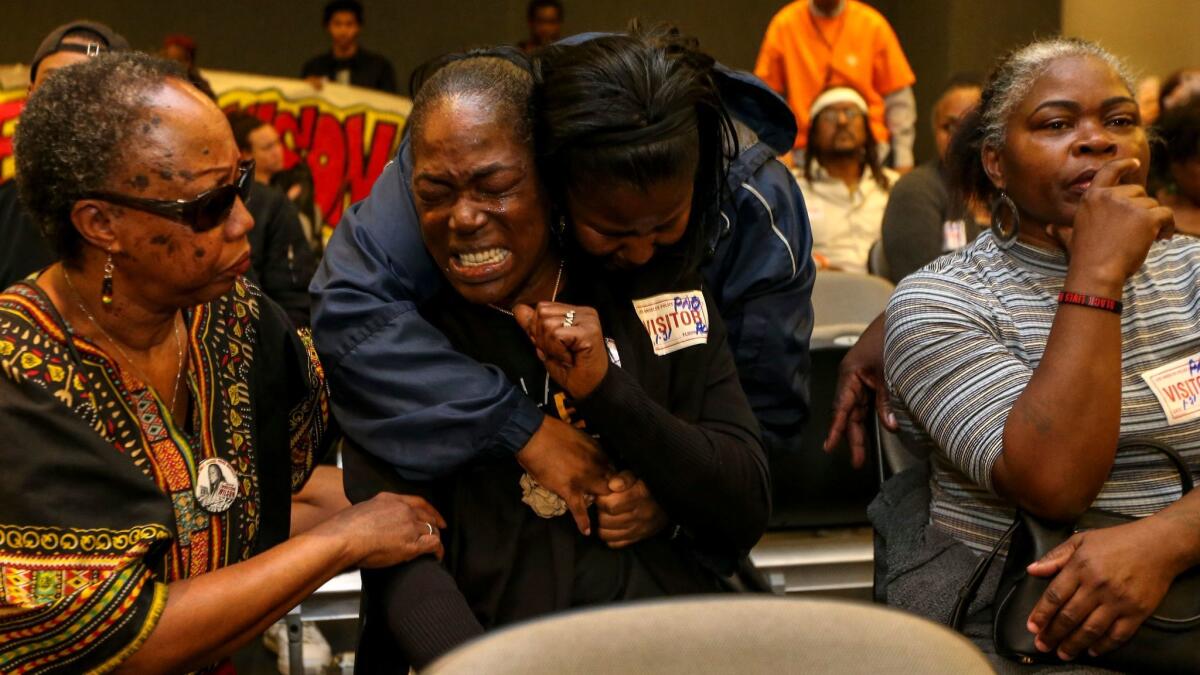Prosecutors: No ‘criminal liability’ in controversial case of woman who died in LAPD jail cell

- Share via
Prosecutors have declined to pursue charges in the controversial case of a mentally ill woman who authorities say hanged herself in a Los Angeles jail cell, saying there was insufficient evidence proving anyone was criminally responsible for her death.
The decision came after the Los Angeles County district attorney’s office reviewed police reports, medical records, interviews with four dozen witnesses and nearly 90 hours of surveillance footage from inside the downtown L.A. jail, according to a report made public Monday.
That evidence indicated that the woman, Wakiesha Wilson, had mental health issues but repeatedly denied feeling suicidal to jail staff before the Easter Sunday in 2016 when she died, the report said. Although Wilson’s cellmate said she later displayed suicidal behavior — yelling “I’m having some thoughts of killing myself!” and wrapping a shirt around her neck — there was not enough evidence to prove detention officers had been notified.
“There is insufficient evidence to prove that a reasonable person would have known that leaving Wilson alone for approximately 33 minutes would result in her death,” the report from prosecutors said. “Wilson’s death was unforeseeable.”
The decision formally closes the investigation into Wilson’s death, which continues to stir anger among her family and their supporters in the Black Lives Matter movement. They have questioned the coroner’s determination that Wilson hanged herself in the cell, chanting her name at weekly Police Commission meetings and demanding to know more about how she died.
Earlier this year, the commission — the civilian panel that oversees the LAPD and reviews all deaths that occur in policy custody — determined that officers did not use force against Wilson and were not “substantially involved” in her death.
The report from prosecutors also concluded that Wilson’s death was a suicide.
Wilson’s family has consistently questioned why she would commit suicide, saying there were no signs that she was distraught when she spoke to relatives on the phone after her arrest. Her mother, Lisa Hines, last year filed a $35-million claim against the city that was later rejected.
An attorney representing Hines, Carl Douglas, said although they were disappointed by the determination by prosecutors, they were not surprised.
“This decision in no way impacts our decision to go forward with civil claims and seek justice out of Ms. Wilson’s death,” he added.
The report from prosecutors revealed that Wilson was “involuntarily confined” for mental health issues nine times between June 2010 and September 2015. Prosecutors pointed to three other episodes in the months before she died that they said illustrated her “ongoing mental health issues.”
The final example cited came in February 2016, when the report said Wilson checked herself into a Culver City hospital, expressing suicidal thoughts, depression and a plan to overdose on medication. Doctors transferred her to a hospital in Van Nuys for further treatment, the report said.
LAPD officers arrested Wilson early March 26, 2016, after the 36-year-old was accused of punching a patient at a downtown hospital, authorities said. Wilson had checked herself into the hospital earlier for back and chest pain.
Throughout the booking process — which began at a downtown police station and ended at the LAPD jail a few blocks away — Wilson told officers and the jail’s medical staff that she had mental health problems and took antipsychotic and antidepressant medication, according to the report from prosecutors. She denied having suicidal thoughts or wanting to hurt herself, the report said.
The next day, one detention officer told investigators that Wilson seemed relaxed and was smiling during the early morning cell checks. The pair talked about Wilson’s Teenage Mutant Ninja Turtles shirt, which jail staff let her keep after she complained of being cold, according to the report.
Wilson’s cellmate, however, later relayed different behavior. The woman told investigators Wilson was “behaving erratically and aggressively,” banging and kicking the door and shouting: “Let me out!” At some point, the cellmate said, Wilson wrapped the shirt around her neck and said, “I’m about to take my life.”
The woman told investigators she thought Wilson was “just being ‘dramatic’ and wanted attention,” the report said. Jail staff and other inmates did not hear or see those actions, the report noted.
When it came time to move the inmates back to a cell block, officers decided to keep Wilson alone in her cell.
About 35 minutes later, a detention officer spotted her on the floor. Wilson had tied her shirt around the cord of a wall-mounted telephone and hanged herself, authorities said.
Douglas said Hines did not believe her daughter was depressed or suicidal in the moments before she died. He pointed to the final phone call between the two on Easter Sunday — Wilson was upbeat and looking forward to talking to the family again later that day, he said.
“Lisa Hines and her family will never accept that Wakiesha Wilson took her own life,” he said.
The report from prosecutors also covered a 21-minute gap in footage from one of the jail’s security cameras, which they said was “inadvertently deleted.” Prosecutors stressed that Wilson was “alive, responsive and animated” after the footage resumed, pointing to the phone call she made to her mother and shadows indicating movement in her jail cell.
“There is no indication of illegal conduct by anyone during that period,” the report said.
More to Read
Sign up for Essential California
The most important California stories and recommendations in your inbox every morning.
You may occasionally receive promotional content from the Los Angeles Times.











